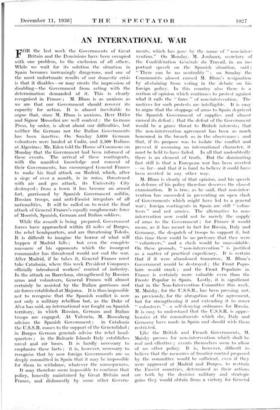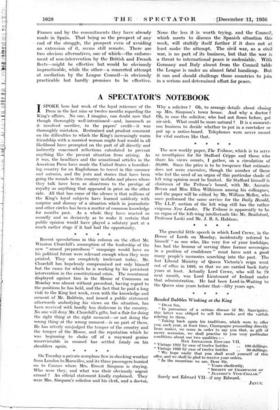AN INTERNATIONAL WAR
FOR the last week the Governments of Great Britain and the Dominions have been occupied with one problem, to the exclusion of all others. While we wait for its solution the situation in Spain becomes increasingly dangerous, and One of the most unfortunate results of our domestic crisis is that it disables—or may create the impression of disabling—the Government from acting with the determination demanded of it. This is clearly recognised in France ; M. Blum is as anxious as we are that our Government should recover its capacity for action. It is almost inevitable to argue that, since M. Blum is anxious, Herr Hitler and Signor Mussolini are well content ; the German Press, by order, is silent aboilt our difficulties, but neither the German nor the Italian Governments has been inactive. On Sunday 5,000 German volunteers were landed at Cadiz, and 2,500 Italians at Algeciras; Mr. Eden told the House of Commons on Monday that the Government had been informed of these events. • The arrival of these contingents, with the manifest knowledge and consent of their Governments, has encouraged General Franco to make his final attack on Madrid, which, after a siege of over a month, is in ruins, threatened with air and gas attack, its University City destroyed ; from a town it has becothe an armed fort, garrisoned by Spanish Government militia, Russian troops, and anti-Fascist irregulars of all nationalities. It will be called on to resist the final attack of General Franco's equally conglomerate force of Moorish, Spanish, German and Italian soldiers.
While the assault is being prepared, Government forces have approached within 25 miles of Burgos, the rebel headquarters, and arc threatening Toledo. It is difficult to imagine the horror of what will happen if Madrid falls ; but even the complete massacre of his opponents which the insurgent commander has threatened would not end the war. After Madrid, if he takes it, General Franco must take Catalonia, where this week President Companys officially introduced workers' control of industry. In the attack on Barcelona, strengthened by Russian arms and volunteers, General Franco will almost certainly be assisted by the Italian garrisons and air forces established at Majorca. It is thus impossible not to recognise that the Spanish conflict is now not only a military rebellion but, as the Duke of Alva has said, an international war fought on Spanish territory, in which Russian, German and Italian troops are engaged. At Valencia, M. Rosenberg advises the Spanish Government ; in Catalonia the U.S.S.R. comes to the support of the Generalidad ; in Burgos German generals advise the rebel head- quarters; in the Balearic Islands Italy establishes naval and air bases. It is hardly necessary to emphasise these facts ; it is, -however, necessary to recognise that by now foreign Governments are so deeply committed in Spain that it may be impossible for them to withdraw, whatever the consequences.
It may therefore • seem impossible to continue that policy, honestly maintained by. Great Britain and France, and dishonestly by some other Govern- ments, -which has gone by the name of " non-inter- vention." On Monday, M. Jouhaux, secretary of the Conf6dCration G6terale du Travail, in an im- portant speech on the Spanish situation, said : " There can be no neutrality " ; on Sunday the Communists almost caused M. 131um's .resignation by abstaining from voting in the debate on his foreign policy. In this country also there is a section of opinion which continues to protest against what it calls the " farce " of non-intervention. The motives for such protests are intelligible. It is easy to argue that the stoppage of arms to Spain deprived the Spanish Government of supplies and almost caused its defeat ; that the defeat of the Government would be a grave threat to British interests; that the non-intervention agreement has been as much honoured in the breach as in the observance ; and that, if its purpose was to isolate the conflict and prevent it assuming an international character, it must be held to have failed. In all that undoubtedly there is an element of truth. But the dominating fact still is that a European war has been averted --so far—and that it is hard to believe it could have been averted in any other way.
M. Blum is clearly of that opinion, and his speech in defence of his policy therefore deserves the closest examination. It is true, as he said, that non-inter- vention has succeeded in preventing an open clash of Governments which might have led to a general war ; foreign contingents in Spain are still " volun- teers " and not armies. The alternative to .non- intervention now could not be merely the supply of arms to the Government ; for France it would mean, as it has meant in fact for Russia, Italy and Germany, the despatch of troops to support it, but this time there could be no pretence that they were " volunteers," and a clash would be unavoidable. On these grounds, " non-intervention " is justified as a matter of practical expediency. It is certain that if it were abandoned tomorrow, M. Blum's Government would be destroyed ; the Front Popti- laire would crack ; and the Front Populairc in France is certainly more valuable even than the Frente Popular in Spain. Lastly, it is significant that in the Non-Intervention Committee this week, M. Maisky, for the U.S.S.R., has been pressing, not, as previously, for the abrogation of the agreement, but for strengthening it and extending it to cover " volunteers "—a self-denying ordinance for Russia. It is easy to understand that the U.S.S.R. is appre- hensive at the commitments which she, Italy and Germany have made in Spain and should wish them restricted.
Like the British and French Governments, M. Maisky presses for non-intervention which shall be real and effective ; events themselves seem to allow of no. other policy. It is, however, difficult to believe that the measures of frontier control proposed by the committee would be sufficient, even if they were approved at Madrid and Burgos, to restrain the Fascist countries, determined as their actions arc . both by the decisive military and strategic gains they would obtain from a victory for General Franco and by the commitments they have already made in Spain. That being so the prospect of any end of the struggle, the prospect even of avoiding an extension of it, seems still remote. There are two obvious alternatives, one of which—the enforce- ment of non-intervention by the British and French fleets—might be effective but would . be obviously impracticable, while the other—a concerted attempt at mediation by the League Council—is obviously practicable but hardly promises to be effective. None the less it is worth trying, and the Council, which meets to discuss the Spanish situation this week, will stultify itself further if it does not at least make the attempt. The civil war,- as a civil war, is no part of its business, but that the war is a threat to international peace is undeniable. With Germany and Italy absent from the Council table the League is under an almost fatal handicap. But it can and should challenge those countries to join in a serious and determined effort for peace.

















































 Previous page
Previous page